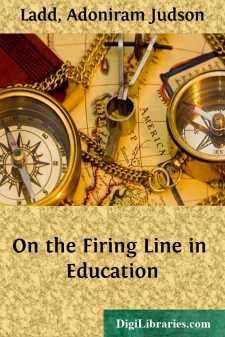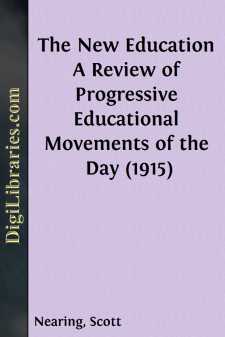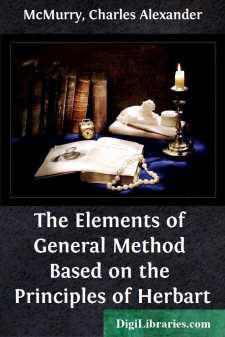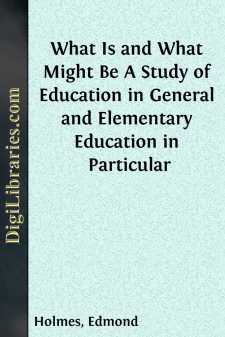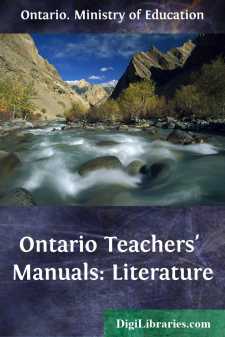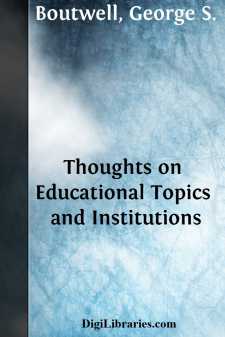Education
General Books
Sort by:
THE NEW IDEAL IN EDUCATION. By Father Nicholai Velimirovic, Ph.D. "Nature takes sufficient care of our individualistic sense, leaving to Education the care of our panhumanistic sense." Ladies and Gentlemen, If we do not want war we must look to the children. There is the only hope and the only wise starting point. It is not without a deep prophetic significance that Christ asked children to...
more...
INTRODUCTION HAVE THE SCHOOLS BEEN DISCREDITED BY THE REVELATIONS OF THE WAR? From School and Society, April 5, 1919 Knowing that I was about to publish a book on education in which the Great War, now happily closed, was not taken as the point of departure, a friend said to me one day, in substance, "Aren't you taking undue risks just now in putting out a book on education that isn't...
more...
I To what a great extent men are ruled by pure hazard, and how little reason itself enters into the question, is sufficiently shown by observing how few people have any real capacity for their professions and callings, and how many square pegs there are in round holes: happy and well chosen instances are quite exceptional, like happy marriages, and even these latter are not brought about by reason. A...
more...
by:
Scott Nearing
PREFACE During 1910, 1911, and 1912, as a part of a general plan to write a book on education, I reread a great deal of the classical educational literature, and carefully perused most of the current material in magazine and book form. An interest aroused by undergraduate and graduate work in the department of pedagogy had been whetted by the revolutionary activity in every field of educational...
more...
IDEALS. A noble aim,Faithfully kept, is as a noble deed.Wordsworth. To few men does life bring a brighter day than that which places the crown upon their scholastic labors, and bids them go forth from the halls of the Alma Mater to the great world's battlefield. There is a freshness in these early triumphs which, like the bloom and fragrance of the flower, is quickly lost, never to be found again...
more...
Gentlemen of the Canadian Club:—Your president has asked me to address you this afternoon in the English language. It is with great pleasure that I received this invitation and that I avail myself of the privilege of speaking to you in that language with regard to the very troublesome, somewhat distorted, and certainly much misrepresented school question in your sister province. First of all, I wish...
more...
THE CHIEF AIM OF EDUCATION. What is the central purpose of education? If we include under this term all the things commonly assigned to it, its many phases as represented by the great variety of teachers and pupils, the many branches of knowledge and the various and even conflicting methods in bringing up children, it is difficult to find a definition sufficiently broad and definite to compass its...
more...
by:
Edmond Holmes
PREFACE My aim, in writing this book, is to show that the externalism of the West, the prevalent tendency to pay undue regard to outward and visible "results" and to neglect what is inward and vital, is the source of most of the defects that vitiate Education in this country, and therefore that the only remedy for those defects is the drastic one of changing our standard of reality and our...
more...
FORM IA.Selections from The Ontario Readers B.Supplementary Reading and Memorization: Selection may be made from the following: I.To be Read to Pupils: 1.Nursery Rhymes: Sing a Song of Sixpence; I Saw a Ship a-Sailing; Who Killed Cock Robin; Simple Simon; Mary's Lamb, etc. ConsultVerse and Prose for Beginners in Reading;Riverside Literature Series, No. 59, 15 cents. 2.Fairy Stories: Briar Rose,...
more...
Words and terms have, to different minds, various significations; and we often find definitions changing in the progress of events. Bailey says learning is "skill in languages or sciences." To this, Walker adds what he calls "literature," and "skill in anything, good or bad." Dr. Webster enlarges the meaning of the word still more, and says, "Learning is the knowledge of...
more...



